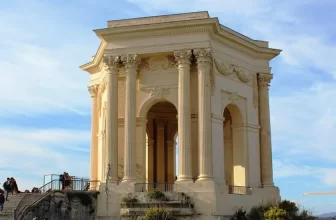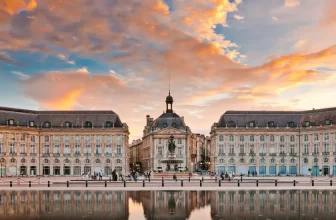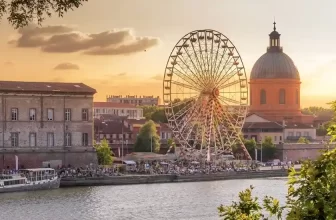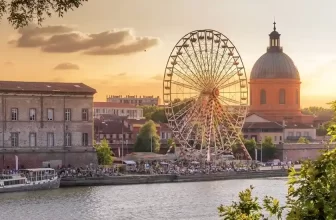
Stepping Into Grenoble for the First Time
The first thing that hits you when you step out of the Grenoble Alpes–Isère Airport isn’t the mountain air-it’s the quiet. Not silence exactly, but this laid-back calm that wraps around you like a soft hoodie. There’s a light breeze, even in early September, and you can already see snow-capped peaks off in the distance. Welcome to Grenoble.
Picture this: It’s your first morning. You walk past a bakery-boulangerie, if you want to blend in-and the smell of warm croissants almost stops you in your tracks. The streets are kind of narrow but clean, with students biking to early classes. Somewhere nearby, a tram glides by, barely making a sound. You grab a €1.50 espresso at a café near the river (honestly, that’s not a myth-they really serve it that affordable) and try not to look too much like a lost tourist.
I remember my own arrival in Grenoble. My suitcase wheels caught on the cobblestones near Place Victor Hugo, and I made eye contact with someone walking their dog. He smiled and said, “Première fois?” (First time?). I nodded, flustered-and that was the first of many small gestures that made me feel strangely comfortable in a new country.
If you’re considering your study abroad options for 2026, this guide on studying in Grenoble is going to walk you through everything I wish someone had told me early on-from how to apply to what you’ll actually spend per month. Let’s break it all down.
Why Study in Grenoble in 2026?
Here’s the thing-Grenoble might not have the worldwide brand name of Paris, but if you’re serious about research, innovation, affordability, and that under-the-radar quality of life-you’re in the right place.
Why now, in 2026? France continues to invest heavily in drawing international talent. As of 2024, over 400,000 international students were enrolled in France, and that number’s climbing. The French government has set a goal to reach half a million within a few years, and Grenoble is one of the key cities contributing to that push.
A few real-world reasons students are choosing Grenoble:
- Science and Tech Hub – Grenoble is home to the European Synchrotron Radiation Facility and MINATEC innovation campus. If you’re in engineering or physics, this is gold.
- Affordable Tuition – France’s public universities charge international students only around €2,770/year for undergrad and €3,770/year for Master’s. Yeah, even in 2026, it’s still that low compared to the US, UK, or even Canada.
- Post-Study Work Opportunities – France allows a 12–24 month stay after graduation for job hunting if you’ve studied at the Master’s or higher level. That’s more generous than a lot of countries right now.
- Student-Centric City – One in every five people in Grenoble is a student, which means student discounts on everything from public transport to gym memberships to skiing gear (seriously).
- Lifestyle – Want to go skiing after your Thursday morning class? The Alps are literally right there. Into hiking, cafés, jazz festivals, or park picnics? Covered.
2026 is a great year to apply, especially with student visa processes in France now more streamlined (more on that later).
So, if you’re looking at cities where education and mountain views live side by side, keep reading. This study guide in Grenoble might just be what seals the deal.
Why Is Grenoble Important for International Students?
Why does Grenoble matter on the global education map?
It’s not just another French city. Grenoble has one of the highest international student ratios outside Paris, with over 16,000 international students from more than 180 countries. And they aren’t just passing through-they come for specialized programs in climate science, computer engineering, nanotech, and business.
Grenoble is also home to Grenoble-Alpes University (UGA), part of France’s prestigious Initiative d’Excellence, meaning it’s one of very few schools recognized for both teaching and world-class research.
But what makes it genuinely work for you?
- The city caters to students-public libraries are well-stocked, housing options are extensive (not always cheap, but more on that later), and career fairs happen multiple times per year, often with employers who speak English.
- Local residents are generally used to international students here. While not everyone’s fluent in English, people are patient, especially if you try to speak a few phrases in French.
- Grenoble is well-connected for industry internships, particularly in tech, clean energy, health innovation, and data science. A few students I know landed spots at STMicroelectronics or even research roles through the ESRF.
Let’s not sugarcoat-adjusting to a new system and culture can be tough (I once got an instant coffee instead of a cappuccino because I ordered wrong), but students here tend to be tightly networked. There are WhatsApp groups for everything. You’ll never be alone unless you want to be.
Top Universities and Colleges in Grenoble
1. University of Grenoble Alpes (UGA)
- Ranking: QS #350 (2025), strong global academic reputation
- Known for: Engineering, Physics, Environmental Science, Humanities
- Tuition (international students): ~€2,770/year (undergrad), ~€3,770/year (Master’s)
- Student life: Huge, mixed-language population. The campus feels like its own city.
- Notable programs: AI and Data Science, Grenoble Institute of Engineering, Literature and Langues Étrangères
- Insider tip: UGA organises French crash courses every semester. Take them.
2. Grenoble Ecole de Management (GEM)
- Ranking: QS Global MBA #101–110
- Known for: Business, Strategic Innovation, Digital Marketing
- Tuition: €13,000–€19,000 per year
- Student life: More international crowd, business-focused events, networking heavy
- Notable: GEM was one of the first few business schools accredited by AACSB, EQUIS, and AMBA
3. Grenoble INP
- Known for: Engineering specialities, especially nano and embedded systems
- Tuition: €2,770/year (avg)
- Vibe: Lots of lab work, research heavy, plenty of collabs with tech companies
- Pro tip: Projects with real-industry application-great for your CV
4. Sciences Po Grenoble
- Known for: Political science, public policy, international relations
- Tuition: €2,770–€3,770/year
- Atmosphere: Political debates, bilingual students, Erasmus-friendly
- Student life: Definitely more humanities and activist-leaning
5. École Nationale Supérieure d’Architecture de Grenoble
- Specialization: Architecture and urban planning
- Tuition: Around €500–€800/year (yes, seriously)
- Vibe: Creative-focused, tight-knit groups
Each school has its own course calendar, internship processes, and even grading scales. Spoiler: the French grading system is… weird. Nobody I know ever got a perfect 20.
Top Student Accommodation Properties in Grenoble
Finding a place to live in Grenoble can be a bit of a maze, but you’ve got options:
1. CROUS Student Residences
- Cost: €250–€400/month
- Amenities: Basic room, shared bathroom/kitchen
- Location: All over the city, some directly near UGA
- Pros: Cheap, reliable. You usually get priority if you apply early.
- Cons: Spartan. Bring your own IKEA budget.
2. Lokaviz & Résidence Ovalee
- Cost: €450–€600/month
- Amenities: Private studios, laundry, bike stand
- Proximity: 10–15 minutes to most campuses
- Tip: Book early. These fill up pre-August.
3. Shared Flats (Colocation)
- Cost: €350–€550/month depending on size, location
- Pros: Social vibe, cheaper than studios
- Cons: Can be hit-or-miss-always Skype with flatmates first
4. Private Student Housing (e.g., Odalys, Suitétudes)
- Cost: €550–€750/month
- Amenities: All-inclusive, secure
- Who it’s best for: First-timers who want peace of mind (and a properly working shower)
Pro tip? Apply as early as April. Housing demand spikes by June.
Popular Student Areas in Grenoble
Finding the right neighborhood in Grenoble can totally shape your study experience. These areas offer different vibes-some are lively, others are more chill.
1. Quartier Saint-Bruno
- Vibe: Diverse, multicultural, slightly edgy
- Average Rent: €350–€500 for shared housing
- Distance from Campus: 10–15 min by tram
- Why Live Here: It’s where you’ll find affordable groceries, mix of student and local life, and great kebab joints
- Watch out for: Older buildings-check heating before you sign a lease
2. Île Verte
- Vibe: Residential and green (the name means “Green Island”)
- Average Rent: €450–€600 for a studio
- Distance: 20 min by tram to central campus
- Pros: Quiet, clean, close to parks and the Isère River
- Con: Not much nightlife-you’ll need to commute for fun
3. Hyper-Centre
- Vibe: Right in the middle of everything
- Average Rent: €500+ for small studios
- Distance: Walkable to UGA downtown buildings, 20 mins tram to main campus
- Pros: Cafés, transport, study spots-everything’s here
- Cons: More expensive and slightly noisy, especially around Place Grenette
4. Gières
- Vibe: Suburban and student-packed
- Average Rent: €300–€450 for shared housing
- Distance: Walking distance to UGA campus
- Pros: Ideal for science and engineering students
- Tip: It’s where “serious” students live-less distraction, more lab time
Pro tip? Use LeBonCoin, Studapart, or Locatme to find housing. And always ask for a “bail étudiant” (student rental contract)-it offers flexible terms and legal protection.
Cost of Living in Grenoble
Let’s talk numbers. Grenoble is cheaper than Paris, but it is France-so budget realistically.
| Expense | Low Range | Mid Range | High Range |
| Accommodation (shared/studio) | €350–€400 | €500–€600 | €700+ |
| Food (groceries + casual eats) | €150–€200 | €200–€250 | €300 |
| Transport (monthly student pass) | €16.60 | €16.60 | €16.60 |
| Phone/Internet | €20–€30 | €30–€40 | €50 |
| Entertainment/socializing | €50 | €100 | €150+ |
| Health Insurance (foreign students) | €20/month | €30/month | Varies |
| Misc (clothes, stationary) | €30–€50 | €70 | €100 |
Total Monthly Estimate:
- Budget Student: €650–€750
- Comfortable Life: €850–€1,000
Money-saving tips:
- Get a Carte Imagine’R Jeune or TAG Student Pass for unlimited transport.
- Shop at LIDL or ALDI instead of Monoprix when grocery-hunting.
- Eat at CROUS cafeterias-3-course meals for €3.30.
- Always carry your student ID-it gets you discounts on museums, gyms, even ski passes.
Where most students overspend? Eating out and late-night Ubers. Grenoble’s super walkable, so skip the extra rides and save.
Scholarships and Financial Aid
Grenoble is part of the French public university system, which means tuition is relatively low. But yes, you can get scholarships to reduce costs further.
Government Scholarships
- Eiffel Excellence Scholarship
- For Master’s and PhD students
- Covers monthly stipend (~€1,200), travel, insurance
- French Ministry of Foreign Affairs Grants
- Offered via local embassies
- Apply through your local Campus France office
University-Specific Funding
- UGA offers Grenoble IDEX Scholarships for outstanding students
- GEM has partial tuition waivers for high GMAT/GRE scores or financial need
External & Hidden Gems
- Fulbright (for U.S. students)
- DAAD (for German applicants)
- MOPGA Scholarships (climate change research)
- Local municipality awards (sometimes offered to students active in Grenoble culture/events-check weekly city forums or associations)
Application Tips:
- Apply early-many have January–March deadlines for a September intake
- Tailor your essays to each opportunity. General SOPs don’t fly for scholarships.
Pro tip: Many programs don’t slap ‘scholarship available’ on the homepage. Email the international office directly and ask. You’ll be surprised how many hidden aid paths exist.
How to Apply – Step-by-Step Guide
Applying to study in Grenoble as an international student can be surprisingly manageable-if you follow the steps.
Step 1: Research & Shortlist (Oct–Jan)
- Use Campus France and each university’s website
- Shortlist based on your program, language (French/English), and tuition range
2: Prepare Documents (Jan–Feb)
- Transcripts in French or English
- Passport
- Language test (IELTS, TOEFL, or DELF for French programs)
- Motivation letter (this one matters-put effort)
3: Apply via Campus France (Feb–March)
- For most countries, you must apply via the “Études en France” platform
- Parallel applications directly to universities may also be required
4: Interview & Acceptance (Mar–May)
- Campus France may call you for a brief interview
- Wait for admission letters
5: Accept & Pay Deposit (May–June)
- Secure your seat
- Prepare proof of residence for visa purposes
6: Apply for Student Visa (June–July)
- Use France-Visas platform
- Gather financial proof (~€7,000 in your bank account), insurance, LOA
7: Book Housing, Flights, Prep for Arrival (July–Aug)
Mistakes to Avoid:
- Applying late-French admin deadlines are strict
- Underestimating document translation time
- Choosing only one university
Visa and Work Rules in 2026
French student visas aren’t scary, but they’re detailed.
Basic Visa (VLS-TS Student):
- Valid for one year, renewable
- Allows work up to 964 hours/year (roughly 20 hours/week)
- You MUST validate your visa online within 3 months of arrival
Visa Application Requirements:
- Proof of admission (LOA)
- Proof of funds (~€7,000–€8,000)
- Housing confirmation (even a temporary address works)
- Health insurance
- Academic documents + passport photos
Timeline:
- Apply 8–10 weeks before departure
- Visa usually takes 3–4 weeks if all docs are in place
Post-Study Opportunities:
- If you graduate with a Master’s or higher, you may apply for the APS (Autorisation Provisoire de Séjour)-a 12-month extension to job-hunt or start your business.
Total Work Rights:
- Part-time jobs are allowed
- Summer break? You can work full-time
- Internships? Allowed, and often mandatory for business/engineering programs
Visa Tips:
- Triple-check the financial proof-this is where many get tripped up
- Your Campus France account will guide you through it. Don’t skip their emails.
Local Transport Facilities
Grenoble’s transport? Surprisingly solid for a city of its size.
Tram and Bus:
- Operated by TAG (Transports de l’Agglomération Grenobloise)
- 5 tram lines connect key student areas and universities
- Weekly and monthly passes available
Monthly Student Pass:
- €16.60/month for unlimited rides
- Recharge via TAG app or vending machines
Cycling:
- City is super bike-friendly, even in winter
- Métrovélo: Rent a yellow bike for €10/month
- Dedicated bike lanes and priority zones all over town
Walking:
- Central Grenoble is walkable-safe, compact, and clear signage
Late Night:
- No 24/7 service, but late trams run until 1 AM on weekends
- Taxis or Uber fills the gap (but they’re pricey, so resist)
Must-have Apps:
- Moovit or TAG Grenoble for bus/tram routes
- CityMapper doesn’t work well here-trust local tools
Student Life, Food Culture, and Day-to-Day Vibes
Here’s what no university brochure will tell you: student life in Grenoble is chill, a little geeky, very outdoorsy, and sneakily artistic.
A typical week? Monday to Thursday, classes start around 8:30 or 9. Depending on your program, you might have long lab sessions (like, 4 hours), especially in engineering. Then you’ll usually catch a tram back to your flat, nap, and maybe crash a CROUS dinner with your housemates.
Weekends? Everyone disappears into the mountains.
Seriously. You’re living at the foot of the Alps-you’re expected to hike, ski, or at least sit on a café terrace pretending you’re into hiking. During the winter, the university arranges regular student ski trips to local resorts like Chamrousse (€25–€30 with gear and transport). In summer, river tubing in Drac River or climbing around Chartreuse hills becomes the move.
Food-wise? Expect lots of baguettes, cheap cafeteria meals, and occasional splurges. Here’s the rotation most students I know live on:
- Boulangerie Les Cèdres – best sandwiches, under €5
- Burger Fermier – your late-night fix after a night out in Saint-Bruno
- Le Tord Boyaux – French dive bar meets expat mixer
- Vieux Manoir Café – strong coffee, free Wi-Fi, 10 min from campus
Cultural surprises? Stores close early-like 7 PM. Sunday is basically illegal in terms of productivity (almost everything’s shut). But you’ll come to value those off days. That’s when students hit museums, board game bars, or the riverside paths.
Social life thrives in student clubs, language exchanges, and the ESN Grenoble events. Think ping-pong tournaments, open mic nights, and improv comedy-in both French and English. And let’s not forget the free student film nights every Thursday near Place Notre-Dame.
Honestly? Grenoble’s vibe is what you make it. It won’t throw excitement at you like Paris. But if you’re down to try new stuff, speak some French, and lean in, you’ll have stories for years.
Internship and Career Opportunities
This might surprise you, but Grenoble is kind of a hidden job market hotspot-especially for international students in tech, science, and green energy.
Key industries here include:
- Microelectronics and semiconductors (STMicroelectronics, Soitec)
- Renewable energy and environmental engineering
- Scientific research (ESRF, CEA Grenoble)
- Software development and AI (growing mid-sized startups around GEM)
A few friends of mine had research assistant positions lined up before graduation. One got a part-time internship during her second semester after just asking a prof if a lab needed help. (French networking is subtle like that.)
Paid vs Unpaid? Most internships are modestly paid-think €500–€800/month-but better than nothing. And yes, student visas allow you to do paid internships.
How to find internships:
- University career portals (UGA and GEM post openings regularly)
- JobTeaser and Welcome to the Jungle
- LinkedIn France (filter by “internship” and “Grenoble”)
- Local job forums and even bulletin boards in your department
Pro tip: Add your past work in English AND French on LinkedIn. I know, translations suck-but it boosts your visibility in French search results.
After graduation, the APS lets you stay one year to search for work. If you do get a job contract? You can switch to a “salarié” working visa in France.
Short-Term Study Abroad Options
Not ready for the full-degree plunge? Grenoble offers plenty of short-term programs ranging from 2 weeks to 3 months:
1. UGA Summer and Winter Schools
- Topics include climate science, AI, nanotech, and digital humanities
- Cost: €1,000–€2,500 incl. housing and field trips
- Best for: Undergrads and Master’s students looking to earn transferable credits
2. Grenoble INP Short Courses
- Engineering boot camps, usually in June–July
- Great for exchange students or tech-focused majors
3. GEM Summer Programs
- Business, innovation, digital marketing
- Case studies, team projects, guest lectures from French startups
Application Process:
- Typically opens in January, closes by March-April
- You’ll need: transcript, basic language proficiency, motivation letter
- Visa not required for stays under 90 days for most countries
These are solid options to get a taste of French student life without too much commitment. Plus, they often come with networking opportunities and social activities.
Application Timeline for 2026
Worried about when to start? Here’s a clear month-by-month checklist for your Grenoble 2026 plan.
| Month | Action |
| Oct–Dec 2025 | Start researching programs & scholarships |
| Jan 2026 | Finalize shortlist, prepare documents |
| Feb–March | Apply via Campus France / direct to unis |
| April–May | Interviews, submit missing docs |
| May–June | Accept offer, pay deposits |
| June–July | Apply for student visa |
| July–Aug | Sort housing, buy insurance & flights |
| Late Aug 2026 | Arrival & orientation week begins |
Tips:
- Check each university’s internal application calendar-they vary
- Block time early to write personal statements or scholarship essays
- Visa appointment slots go fast in summer-schedule early!
Planning ahead = less stress later. Trust me on this.
Public vs Private Universities Comparison
Let’s break it down:
| Feature | Public Universities (e.g., UGA) | Private Schools (e.g., GEM) |
| Tuition Fees | €2,770–€3,770/year | €10,000–€19,000/year |
| Class Size | Large lectures, sometimes 100+ | Smaller, seminar-style |
| Reputation | Strong in research & theory | Strong in business and real-world projects |
| Facilities | Basic but functional | Modern, more tech-savvy |
| Language of Instruction | Mostly French (with English options) | Primarily English |
| Financial Aid | Government aid, fewer merit-based awards | More scholarships for international students |
Takeaway: If cost is your priority, public schools win. If you want personalized support and global business exposure, private schools like GEM might be worth the higher fee-just budget accordingly.
Final Thoughts – Why Grenoble is the Perfect Study Destination
Because it’s got that rare combo: serious academics without the city-stress. It’s where you can discuss quantum physics over espresso in the morning, then go skiing by afternoon. Tuition is low. Networks run deep. And the vibe? Honest, unpretentious, quietly inspiring.
Who it’s perfect for:
- Science/tech or sustainability students
- Budget-conscious international students
- People who like coffee-shop conversations and mountains more than mega-cities
Maybe not ideal if:
- You need a big-city cosmopolitan feel 24/7
- You’re looking for warm weather all year (winters are… real)
First-year mentor tips:
- Take the French intensive course, even if your program is in English.
- Join the ESN or student societies-instant connections.
- Don’t blow your budget at Monoprix-use LIDL.
- Always carry change for baguette vending machines (yes, they exist).
- Say “bonjour” everywhere, even at the library.
Grenoble’s not flashy-but it grows on you. You’ll leave smarter, stronger, and way better at dodging tram schedules.
Top FAQs About Studying in Grenoble
Not too bad. Budget around €750 per month if you’re careful with groceries and housing.
Yes, up to 20 hours/week during term and full-time during breaks with a valid student visa.
Not for English-taught degrees, but basic French helps a lot-especially for part-time jobs or negotiating with landlords.
Generally safe, especially in student areas. Be cautious at night in areas like Saint-Bruno and avoid unlit parks late.
Master’s grads can apply for a 12-month job-search visa (APS), extendable if you get a job offer.
Yes-government, university, and regional options exist. Apply early, and don’t just rely on flashy websites-email admin offices.
Start research by October 2025, apply by Feb–March 2026, and get your visa work going by June at the latest.






